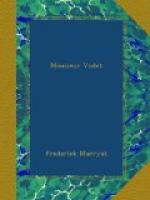Even the otherwise imperturbable horse of our savant would sometimes have an estampede after his own fashion; lazy and self-willed, preferring a slow walk to any other kind of motion, this animal showed in all his actions that he knew how to take care of number one, always selecting his quarters where the water was cool and the grass tender. But he had a very bad quality for a prairie travelling nag, which was continually placing his master in some awkward dilemma. One day that we had stopped to refresh ourselves near a spring, we removed the bridles from our horses, to allow them to graze a few minutes, but the savant’s cursed beast took precisely that opportunity of giving us a sample of his estampede. Our English friend had a way, quite peculiar to himself, of crowding upon his horse all his scientific and culinary instruments. He had suspended at the pommel of the saddle a thermometer, a rum calabash, and a coffee-boiler, while behind the saddle hung a store of pots and cups, frying-pan, a barometer, a sextant, and a long spy-glass. The nag was grazing, when one of the instruments fell down, at which the beast commenced kicking, to show his displeasure. The more he kicked, the greater was the rattling of the cups and pans; the brute was now quite terrified; we first secured our own steeds, and then watched the singular and ridiculous movements of this estampedero.
He would make ten leaps, and then stop to give as many kicks, then shake himself violently and start off full gallop. At every moment, some article, mathematical or culinary, would get loose, fall down, and be trampled upon. The sextant was kicked to pieces, the frying-pan and spy-glass were put out of shape, the thermometer lost its mercury, and at last, by dint of shaking, rolling, and kicking, the brute got rid of his entire load and saddle, and then came quietly to us, apparently very well satisfied with himself and with the damage he had done. It was a most ludicrous scene, and defies all power of description; so much did it amuse us, that we could not stop laughing for three or four hours.
The next day, we found many mineral springs, the waters of which were strongly impregnated with sulphur and iron. We also passed by the bodies of five white men, probably trappers, horribly mangled, and evidently murdered by some Texan robbers. Towards evening, we crossed a large fresh Indian trail, going in the direction of the river Brasos, and, following it, we soon came up with the tribe of Lepans, of which old Castro was the chief.
CHAPTER XXI.
The Lepans were themselves going northwards, and for a few days we skirted, in company with them, the western borders of the Cross Timbers. The immense prairies of Texas are for hundreds and hundreds of miles bordered on the east by a belt of thick and almost impenetrable forests, called the Cross Timbers. Their breadth varies from seventy to one hundred miles. There the oak and hiccory grow tall and beautiful, but the general appearance of the country is poor, broken, and rugged. These forests abound with deer and bears, and sometimes the buffalo, when hotly pursued by the Indians in the prairies, will take refuge in its closest thickets. Most of the trees contain hives of bees full of a very delicate honey, the great luxury of the pioneers along these borders.




